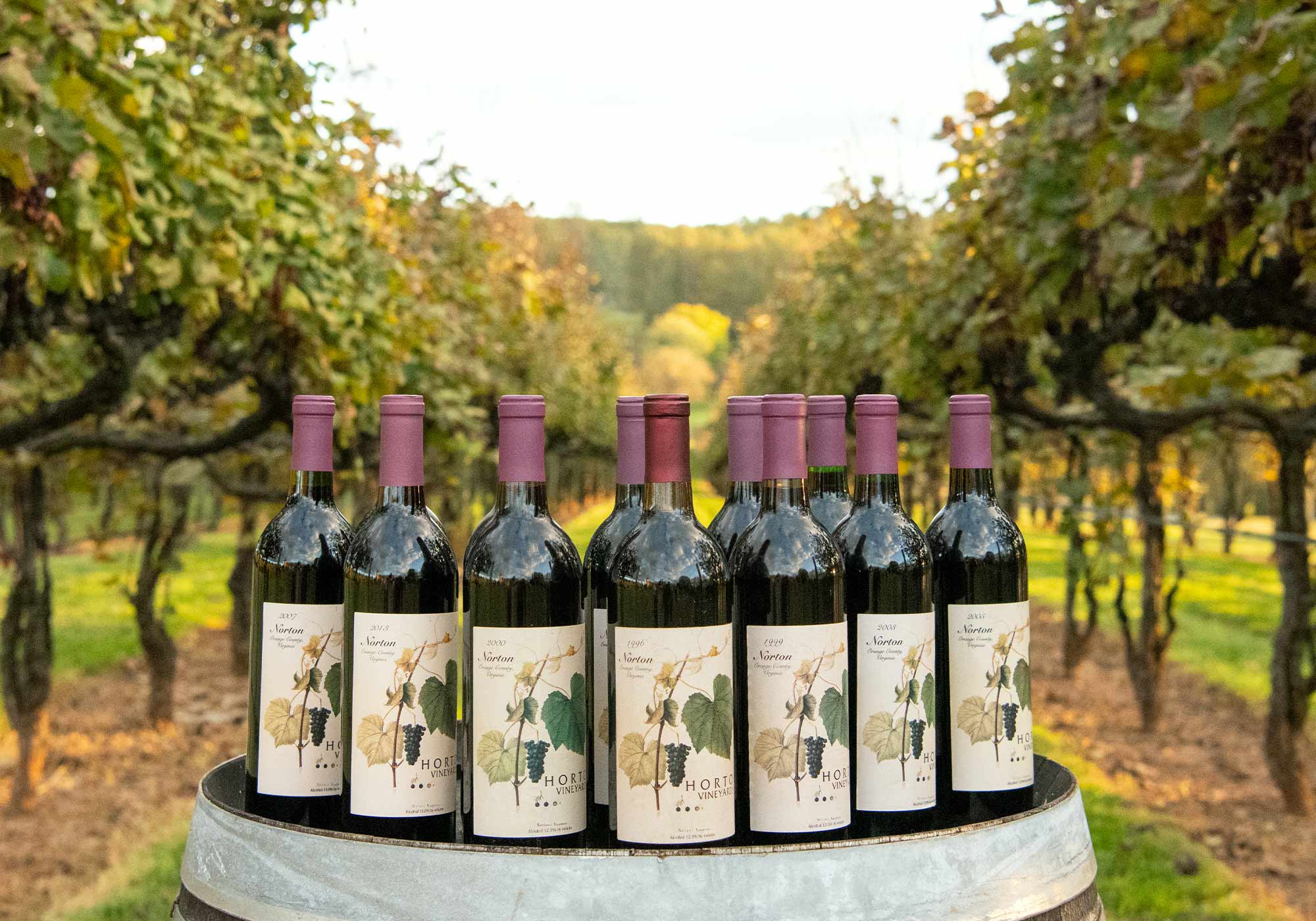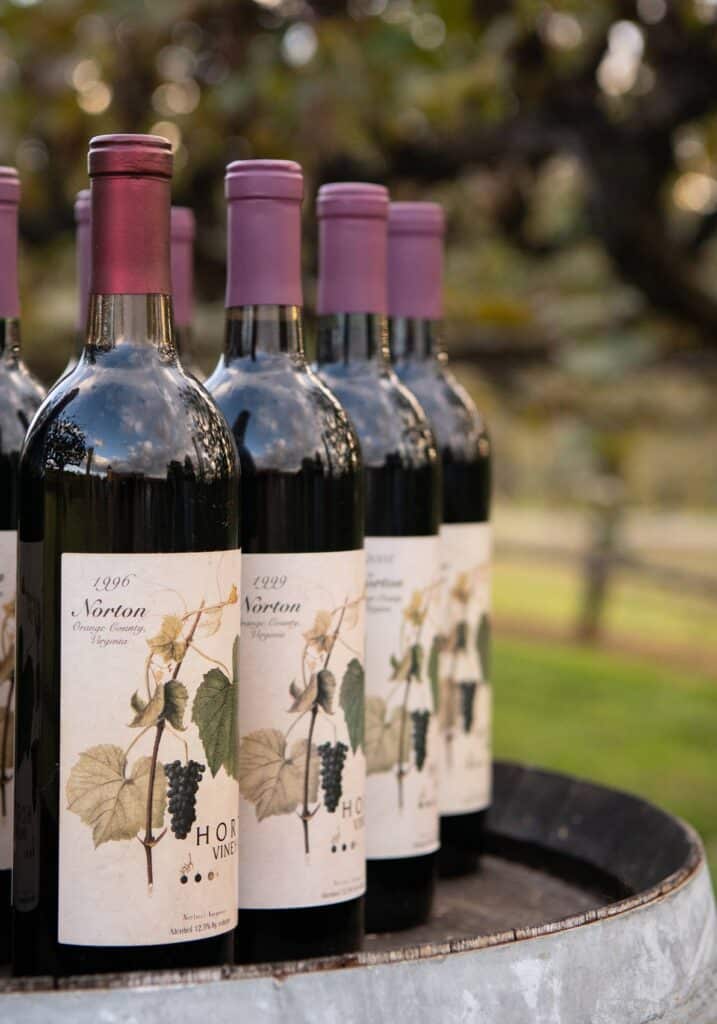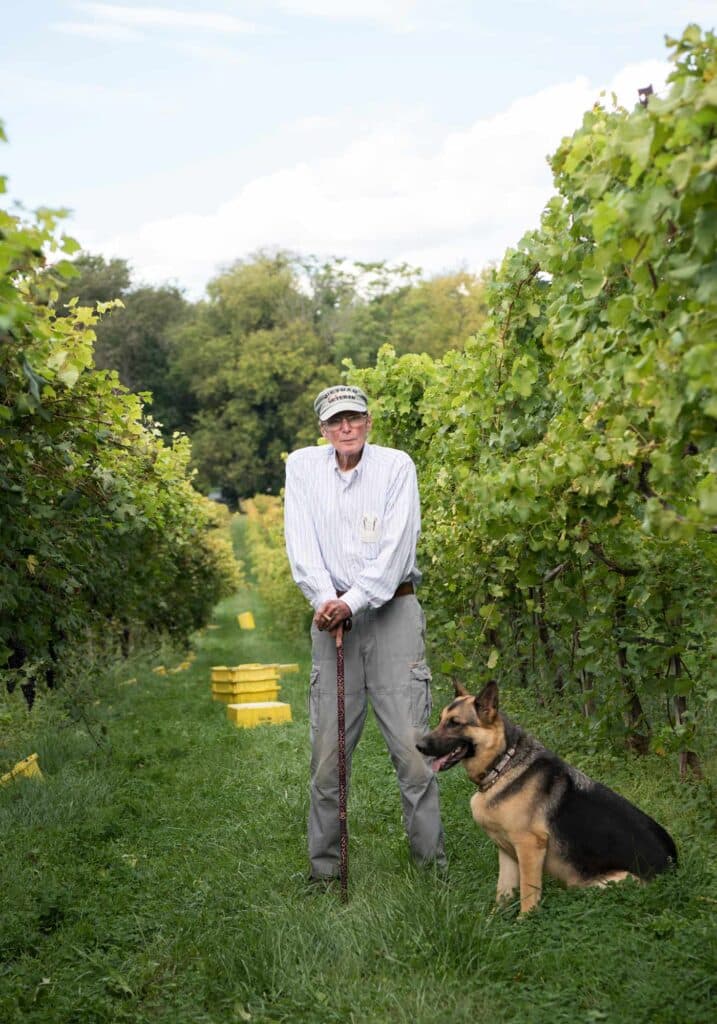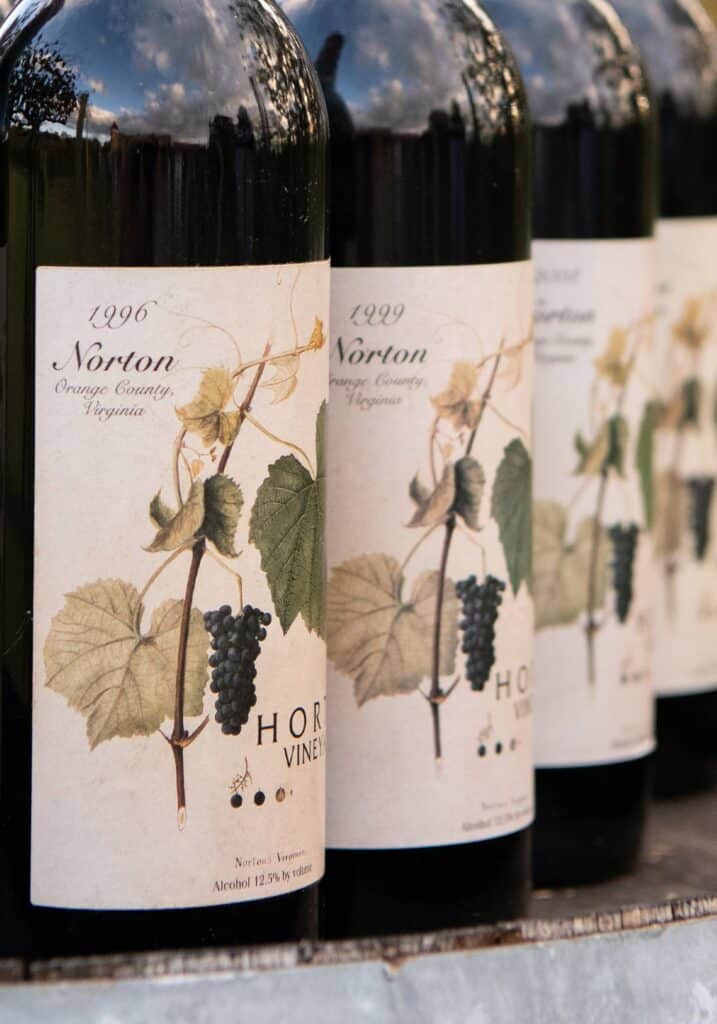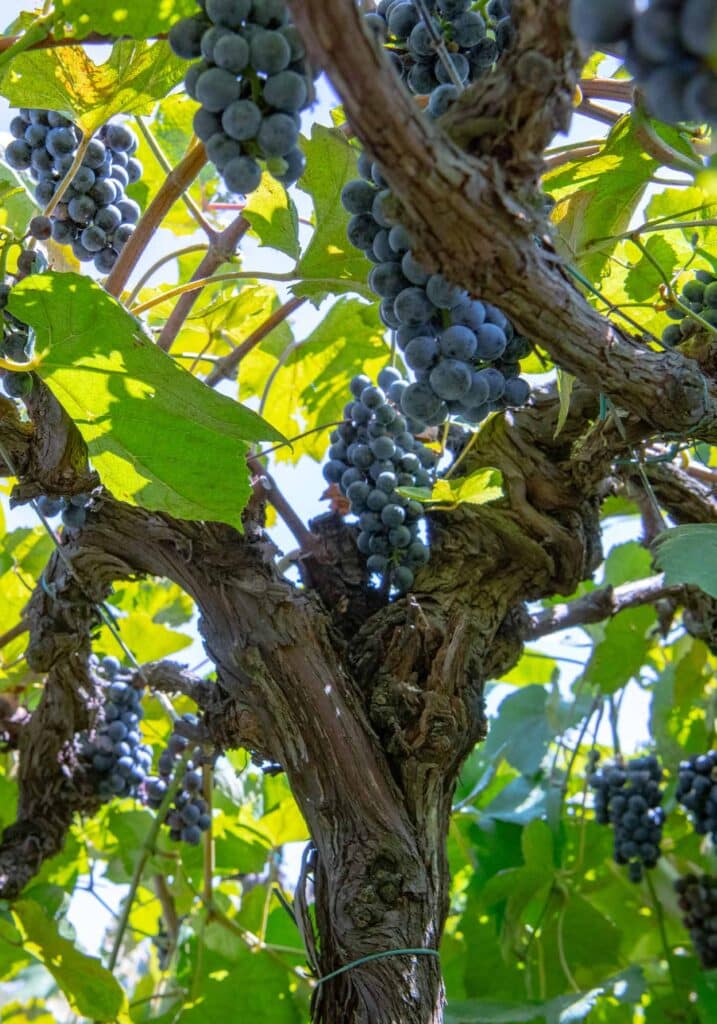In the 1980s, the late Dennis Horton of Virginia’s fabulous Horton Vineyards led the charge to reintroduce the Norton grape to its native state. Decades later, Virginia winemakers have gathered together to form a coalition to celebrate and promote the Norton grape. In October 2024, wineries participating in the Norton Network are opening their doors to patrons and highlighting their favorite Norton wines. Horton Vineyards is of course helping to lead this charge and plan to display a stunning array of Horton Nortons from vintages as far back as 30 years ago. Wineries across the state are joining in the celebration of Norton, launching a Virginia Norton Wine Tour from October 18th to November 10th.
“The Best Red Wine of All Nations” was the coveted prize at the Vienna World Fair of 1873, and it was won by a Norton wine. Norton, a grape variety discovered in Richmond, Virginia, had a big 1800s moment in wine history, when it gained global popularity and was the pride of the United States.
On what is today a bustling city block in Richmond’s neighborhood of Shockoe Bottom, near Broad Street, a grape vine cutting grew in the small garden of Dr. Daniel Norton (1794-1842). Norton was a physician with a particular interest in plants.
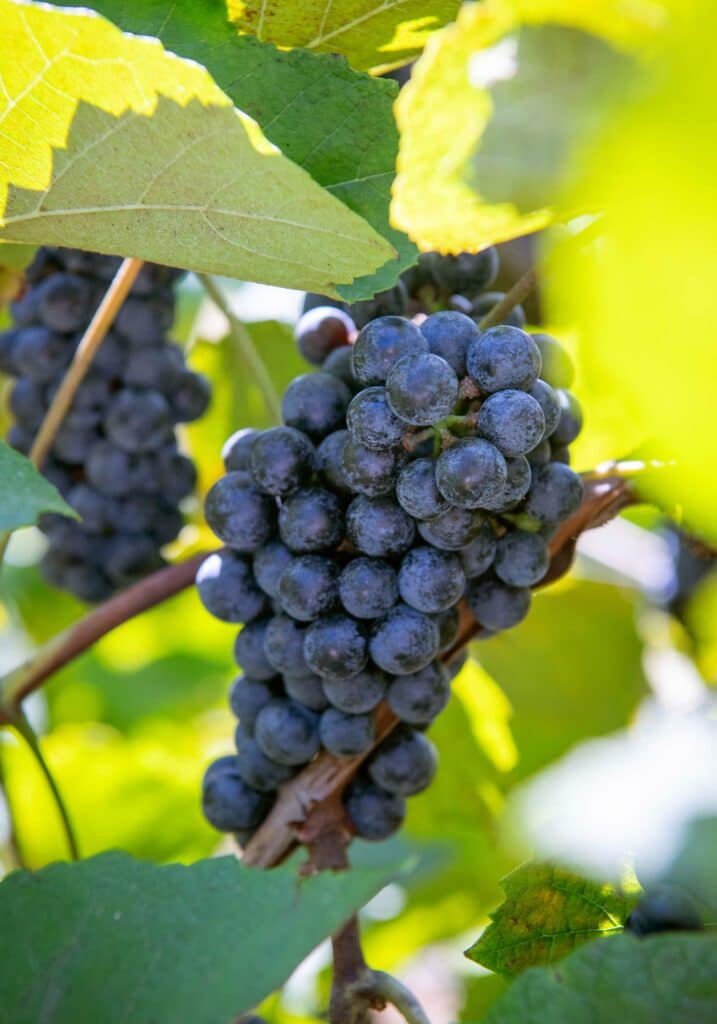
The grape was an accident of nature, a natural hybrid occurring by a cultivated European grape pollinating a wild Virginia rootstock. Norton believed this grape could be a foundation of a successful local Virginia wine industry, and in the early 1800s he promoted it as such. Branded with his name, Norton vine cuttings started to proliferate throughout Virginia and were also taken to other states. It thrived in Missouri, where over 300 acres survive to this day. Norton grows well in the cold and also thrives in humid conditions, which makes it perfect for Central Virginia.
How the Norton Grape Saved the Wine Industry
The Norton grape variety arrived at a pivotal moment for viticulture. The U.S. had struggled for centuries to establish a wine industry. Unknown to many of the vineyard farmers, a small aphid-like bug native to the U.S. northeast called phylloxera was killing imported European vine roots before they could establish. Indigenous grapes were immune to its effects, but imported vines would usually die within a few years. Some creative growers pollinated indigenous grape vines with European grape vines and came up with new varieties that flourished in most vineyards. Because these new grape varieties had parents from two different species, they became known as ‘hybrids’ or ‘multi-vitis’ grapes. Norton is one of these hybrid grape varieties.
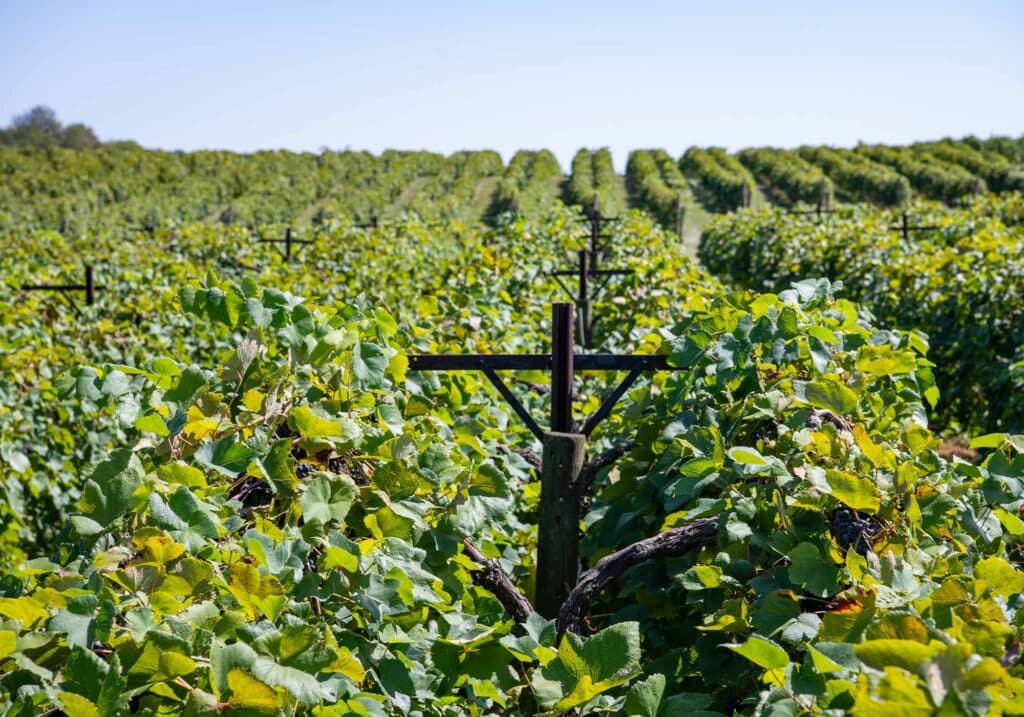
Many pre-Prohibition Virginia vineyards were planted to indigenous or hybrid grape varieties that thrived despite the presence of phylloxera. As a hybrid, Norton thrives even in phylloxera conditions. It was an obvious choice for farmers in the 1800s to grow this grape variety, which makes a bold-style, flavorful red wine.
But phylloxera still lurked in the background of 1800s agriculture. It traveled to Europe around the time of Norton’s glorious win at the Vienna Fair, and soon after that it spread from France to Spain and Greece and beyond. It left near-total devastation in its path, killing most acres of European grape vines. This caused a global shortage of wine, started recessions in wine-centric regions, destabilized an untold number of farmers and led to general panic and mayhem in agriculture. To this day, few places in the world are untouched, and those that are have strict protocols to prevent phylloxera contamination. In this emergency environment, as the global wine industry struggled to plot a course forward, Norton was coveted as a solution to the problem. Farmers could plant Norton, have a decent viable crop and be unscathed by phylloxera even as it lurked in their vineyards.
Horton Brings Norton Back to Virginia
In time, farmers discovered that if you grafted a European grape vine onto the roots of an American vine, the vine would survive in phylloxera conditions and the grapes would still taste like the varieties people were accustomed to. A mad rush to replant vineyards with existing grape varieties on U.S. or hybrid rootstocks ensued.
Once grafting became common practice, a major backlash against hybrid grapes occurred. Misinformation abounded. Hybrids were advertised as being dangerous and were widely accused of making bad wine. Even as their rootstocks are used generously in most vineyards throughout the world, fruit from hybrid grapes are still outlawed in many European wine laws.
Amidst this backlash against hybrids, Norton—once the hope of the future and a darling in its own right—became reviled in some agriculture communities. The near total smearing of hybrid grape varieties still persists in many wine communities, though there are many sommeliers and main-stream wineries who have started to embrace these grape varieties over the last decade. Notable winemakers include Pascaline Lepeltier, who makes hybrid wine in New York State, and Jahdé Marley, who regularly promotes hybrids at popular wine tastings. Still, there are many sommeliers and winemakers who blatantly reject hybrid grape varieties. The best way to challenge this thinking is usually a blind tasting.
Partly because hybrids were shunned in Europe, Norton dwindled. Then it disappeared in Virginia after Prohibition put most wineries out of business. Thankfully, Norton continued to be farmed in Missouri during the 1900s. In the 1980s, the late Dennis Horton (seen here in 2017), a winery founder known for growing dozens of different grape varieties to experiment with how they behaved in Virginia, heard about Norton. Horton, originally from Missouri, brought cuttings home to Virginia. He released a Virginia Norton wine in 1992, and his “Horton Norton” wine has since been a mainstay calling card of the popular winery. This particular bottling was popular in Central Virginia in the early 2000s, poured by-the-glass at many Charlottesville bistros.
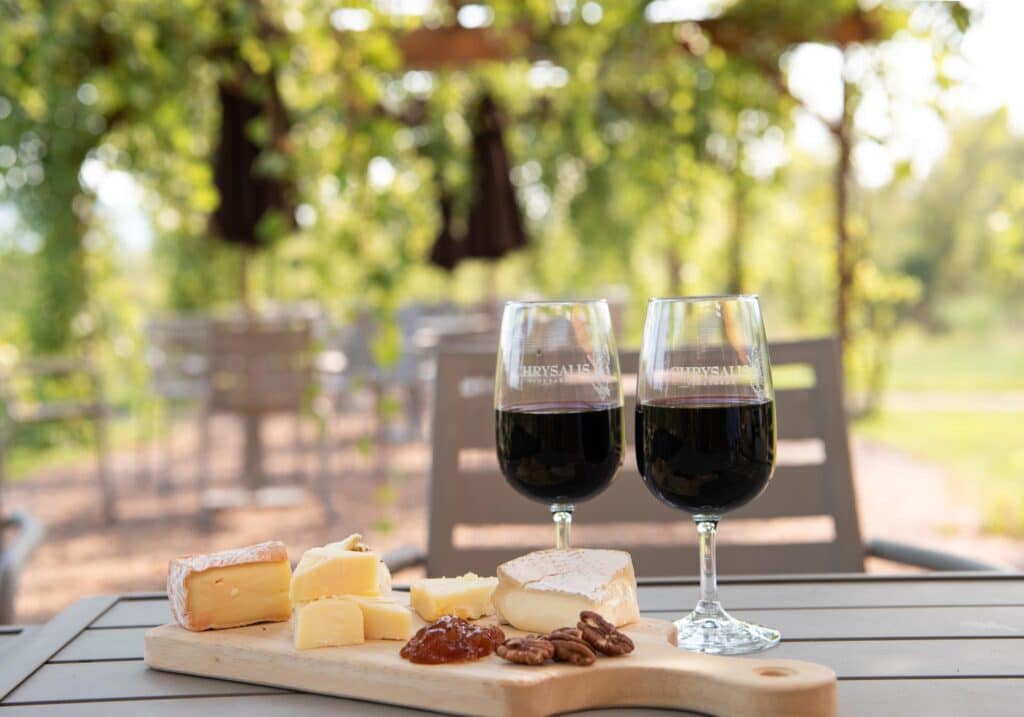
With the help of long tine friend Dennis Horton, Jennifer McCloud of Chrysalis Vineyards is also a Norton champion, with a long legacy of producing Norton bottlings. McCloud’s Norton is particularly lush and age worthy; it embodies something timeless about the grape. Norton in general has an uncanny ability to age, which we are just starting to see in Virginia. Earlier this year, I had the opportunity to sample a 2003 Chrysalis Norton, and the wine’s still-fresh aromas had stunning, unfolding tasty layers of plum skin, ripe cherry and clove flavors. A good way to test this agreeability is to buy a few bottles of the same vintage and sample the wine over a decade. It’s a fascinating transformation to experience over time. Norton boasts high levels of resveratrol, an antioxidant that makes it attractive to grape growers and also contributes to the potential for deep, rich flavors, while bolstering its ability to age.
Norton Wine Today
Though Norton is still shunned in wine communities that dislike hybrids, there has been a seismic shift in thinking over the last five years. Hybrids can often withstand extreme weather conditions, so they are being looked to as a solution for vineyards that struggle with climate change or extreme weather conditions.
Each year the hybrid wine category gains momentum as more and more delicious bottlings challenge negative perceptions about hybrids. Try Rosemont Vineyards’ Sparkling Chardonel, Early Mountain Vineyards’ Young Wine Red made of Chambourcin and Lightwell Survey’s Strange Hybrid Moments, which combines several grape varieties. In 2023, hybrids now inhabit an almost niche and stylish space in the wine world. Once practically shameful in fancy wine circles, they are now consumed more regularly and often with a sense of pride. As you explore this category of wine, Norton is a must-try. After all, it’s the hybrid that endured before it was “cool.”
Sommeliers around the world have taken note of this storied, yet somehow still nascent, grape variety. Paul Greico of Terroir Wine Bar in New York City has been interested in Norton for years. Thanks to Greico, you’ll see Norton on big-city wine lists. But if you’ve dined in Virginia, you’ve probably already been in-the-know for the last 15 years. And who knows—maybe our Richmond-born Virginia grape variety will one day reclaim its 1873 celebrity as The Best Red Wine of All Nations.
A Rare Opportunity to Experience the 30 Year Journey of Horton’s Norton
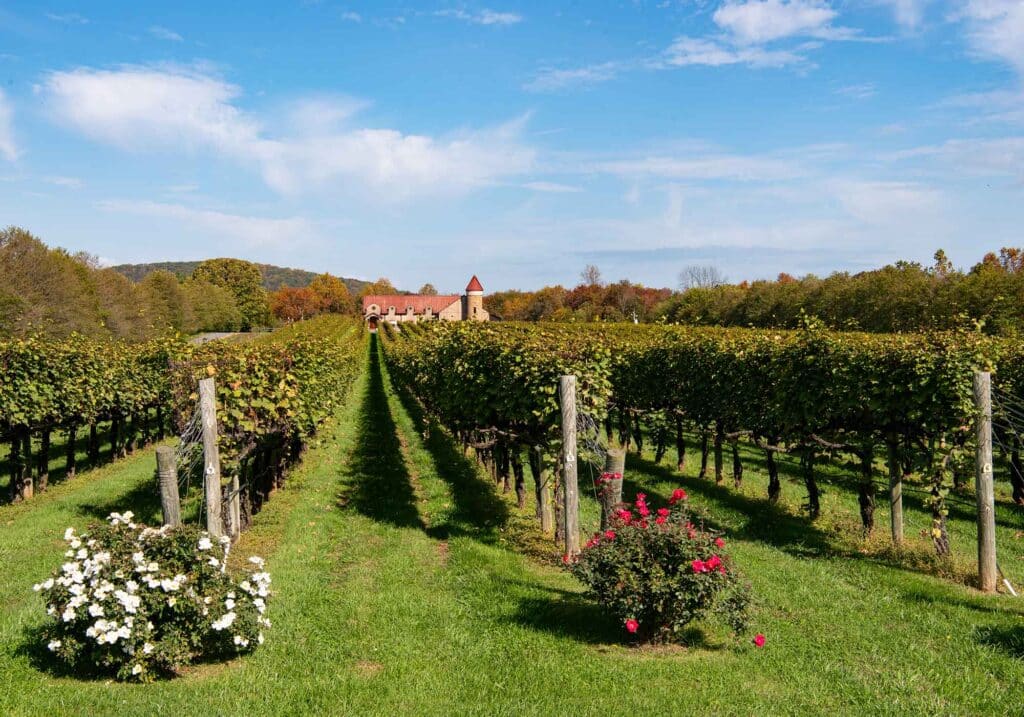
During the tour, Horton Vineyards plans to unveil vintages of Norton wine from as long as thirty years ago. Their impressive collection will be on display during their wine tour for visitors to sample. “We’re really excited to see the Norton grape find its way into the hearts of wine lovers today and be celebrated throughout Virginia,” said Shannon Horton of Horton Vineyards. “I know my father was especially proud to be a part of bringing it back to Virginia and my mother, who still today tends to our vines, has a special place in her heart for Norton.”
All About the Norton Network and Norton Tour 2024
In 2024, the Virginia Norton Network has planned a series of exciting events celebrating the historic native Norton grape. The Virginia Norton Wine Tour will take place over the months of October and November. Each weekend, participating Virginia wineries will host events and tastings dedicated to raising awareness of Norton wine. The 22 wineries involved in the Norton Network include Barrel Oak Winery and Brewery, Bluemont Vineyard, Cana Vineyards and many more. Leading the charge are Chrysalis Winery and Horton Vineyards, both of whom have made incredible strides reinvigorating the popularity of this grape with a modern audience.
ERIN SCALA, a wine writer and Richmond native, recalls harvesting Virginia grapes in her earliest memories. She owns In Vino Veritas Fine Wines in Keswick, writes the thinking-drinking.com wine blog, and contributes to the wine podcast “I’ll Drink to That.”
R. L. JOHNSON is our Co-Publisher and Creative Director. Bethke studied at the prestigious ArtCenter College of Design and began her career as a professional photographer in Los Angeles. She moved into graphic design and art direction when she relocated to Charlottesville in 1994. As our company’s co-founder and visionary, she enjoys all aspects of storytelling.

